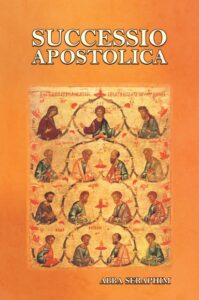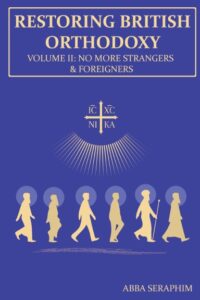About the British Orthodox Church
Who are we?
The British Orthodox Church is a small autonomous Orthodox jurisdiction, originally deriving from the Syrian Orthodox Church. It was canonically part of the Coptic Orthodox Patriarchate of Alexandria from 1994-2015, before amicably returning to its original status in order to fulfil its mission more effectively.
That mission is to the people of the British Isles, regardless of their ethnic and cultural background and is not the preserve of any one people. Orthodoxy is about the faith we hold (‘right belief’) and the way we worship. By maintaining the two thousand year tradition and life of Orthodox Christianity, we witness to the universal patrimony which belongs to all Christians. Yet conscious of our own religious history, we have a deep appreciation of the Orthodox heritage of these islands.
A Little History
On 2 June 1866 a former French Dominican priest, Jules Ferrette (1828-1904), was consecrated to the episcopate as “Bishop of Iona and its Dependencies” by the Oecumenical Metropolitan of the Syrian ‘Jacobite’ Church (Boutros ibn Salmo Mesko, 1799-1894). There was considerable opposition from the Established Church to what it considered an invasion by a foreign jurisdiction and attempts to question the authenticity of the new bishop, despite the British Consul in Damascus having witnessed the Instrument of Consecration. The Oecumenical Metropolitan subsequently became Syrian Patriarch of Antioch in 1872 as Mar Ignatius Boutros IV.
It is worth noting that in 1889 he also authorised the consecration of a Metropolitan to minister to converts from Catholicism in Ceylon, Goa & India and in 1891 he authorised the consecration of another Metropolitan for the Old Catholics in America.
From the consecration of Ferrette a succession of bishops was maintained, though the church remained very small. Contacts with the Syrian Church were not sustained and it was regarded as uncanonical by other Orthodox churches.
Metropolitan Seraphim, who has been the Primate since 1979, restored contact with our Oriental Orthodox roots with whom we had lost contact over the years. In the interests of Christian unity, and through the vision and generosity of the late Pope Shenouda III, the British Orthodox Church was received into the ancient Coptic Orthodox Patriarchate of Alexandria. In 1994 Abba Seraphim was received in his orders, before being consecrated in Cairo as Metropolitan of Glastonbury by Pope Shenouda III, assisted by some sixty three Metropolitans and Bishops.
The 1994 Protocol with the Coptic Orthodox Church recognized the British Orthodox Church as
“A local church, holding to the historic faith and order of the Apostolic Church, committed to the restoration of Orthodoxy among the indigenous population and desiring to provide a powerful witness to the Orthodox Faith and Tradition in an increasingly secular society.”
It is not part of a diaspora ministry from a mother church elsewhere, but rather an implanted seed from those ancient Christian churches which have faithfully preserved their heritage through centuries of persecution and hardship. For the British Orthodox Church, the late Pope Shenouda (1923-2012) will always be a profoundly loved and venerated figure. We have been blessed to be called children of the Alexandrian See, which we have grown to love and respect and which we have been proud to call our Mother. Although we are not Hebrews, we love the Old Testament saints and prophets and we rejoice in the daily recitation of the Psalms of David the prophet and king. In the same way, although we are not Copts, we love the Coptic saints and martyrs, we cherish its monastic heritage and we are guided by the theological insights of the Alexandrian tradition.
The jurisdiction of the British Orthodox Church extends over the United Kingdom, the Republic of Ireland, the Isle of Man and the Channel Islands. In the British Isles there are many other Orthodox communities from diverse ethnic backgrounds, with whom we share a common faith. We are the only Orthodox community in the British Isles which has an English diocesan bishop with a definite mission to bring Orthodoxy to British people without imposing ethnic and cultural attitudes. We recognise that there are also British-born clergy and faithful in other parts of the Orthodox Church, so we do not assert that we alone have this vocation to mission, but for us it is our primary purpose. We welcome all opportunities of ecumenical co-operation and witness.
Where we are today
The British Orthodox today comprises parishes and missions throughout the British Isles. All our services are in English and we venerate the Orthodox saints of the British Isles as well as those of the wider Orthodox Church. We use the ancient Liturgy of Saint James as our normal liturgy, together with other traditional services of the Coptic Orthodox tradition, such as the morning and evening Raising of Incense.
Although the British Orthodox Church is a small community at present, it is committed to evangelism and wider ministry. Through the British Orthodox Press we publish the ‘Glastonbury Review’, the only English language journal to contain regular reports of the activities of all Oriental Orthodox churches as well as historical and theological articles and book reviews.
During our two decades as part of the Alexandrian Patriarchate, Metropolitan Seraphim became a noted international lecturer and played an active part in ecumenical dialogues (serving as a Vice President of the Council of Oriental Orthodox Churches and as a member of the Catholic-Oriental Orthodox Forum, the Ecumenical Society of St. John Chrysostom, the Anglican-Oriental Orthodox Forum and the Tur Abdin Focus Group) as well as giving active support for persecuted Christians seeking asylum in the United Kingdom (The Asylum Advocacy Group and the Council of Reference for Christian Research). He is widely travelled, having made more than thirty trips to Egypt and has also travelled to Oriental Orthodox communities in Armenia, South India, Syria, Turkey, as well as Europe and Australia.
Committed to Sharing our Faith
Much of the time and energy of the British Orthodox Church is spent instructing those who want to receive the riches of the Orthodox Faith as well as supporting those small communities which are scattered about the country, sometimes as families or as individuals. The clergy are often obliged to travel considerable distances in order to minister to remote members of their flock. We are convinced that the Orthodox Faith is the fullness of the Christian life, and that we have a great responsibility to share this Faith with all those among whom we live.
We appreciate that, like each one of us, those with whom we share are also on a spiritual pilgrimage as they seek to be obedient to God’s will. Therefore, we do not try to do God’s work of converting hearts to the Orthodox way of being a Christian, rather we seek to help each person understand what we have been entrusted with, and to experience it for themselves as far as they are able in their own circumstances.
The British Orthodox Fellowship was created so that friends and enquirers can join a community of similarly minded Christians, even while they are not yet ready, or able, to become members of the British Orthodox Church. We hope this will be another means of sharing the treasures of our Faith, and reaching British people with the Orthodox Gospel.




